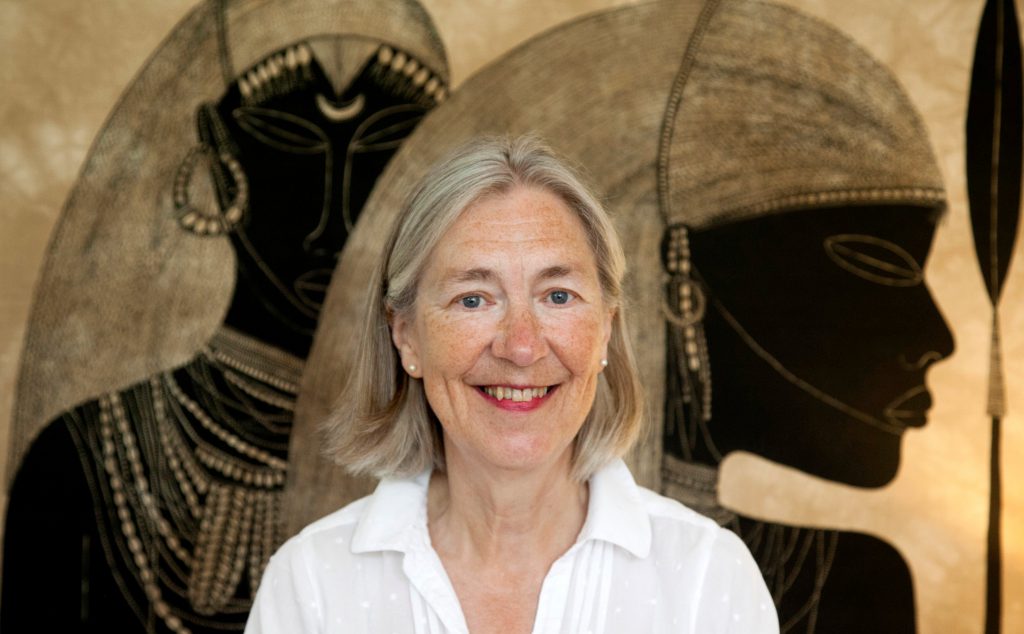What is MND
Find support
I have MND
I am supporting someone
Get involved
Research
About MND Scotland

Born and schooled in Northern Ireland, Ruth qualified as a speech therapist from the Leicester School of Speech Pathology in 1972. She later was awarded a Master’s degree in Speech Sciences from the University of Leeds followed by research at the University of Manchester leading to a PhD in Communication Disorders.
Ruth has practised as a speech and language therapist both within and outside the UK. She has worked in Northern Ireland; Manchester; Kenya; Hong Kong; Guernsey; and most recently, in Germany. She has also taught at the University of Manchester. On arrival in Edinburgh, Ruth taught English to speakers of other languages at the Berlitz Language School on Frederick Street.
Having spent her whole working life helping others to improve their speech and language skills, Ruth’s diagnosis now means that she is having to come to terms with losing her own speech.
She said: “There are a number of challenging symptoms with the onset of MND, however, right now, the most challenging symptoms for me are losing independence due to my difficulty in walking, and losing my speech. Verbal communication becomes increasingly difficult as symptoms progress with MND, due to increasing weakness in the tongue, lips and vocal cords in addition to breathing difficulties.
“I so enjoyed my work as a speech and language therapist providing intervention to children and adults with speech, language and communication needs. Conventional speech intervention is not appropriate for those with MND in contrast to some other neurological conditions.”
It was in 2013, after moving to Edinburgh, that Ruth began experiencing the initial symptoms of MND.
“I was becoming increasingly aware of my gait. I noticed I had difficulty walking in a straight line and when trying for example, to run for a bus, I was aware I couldn’t run as quickly as in the past. In addition, when tired, the rate of my speech was slower than usual. No-one else seemed to notice the initial change in my speech; I guess my training as a speech and language therapist made me very aware of the initial minor changes.”
It was in late 2013 during a holiday in New Zealand that Ruth decided to follow up her concerns.
“I was used to cycling in Germany on a daily basis but when cycling through the vineyards in New Zealand I found it difficult to mount my bicycle. I also felt my balance was not as good as in the past.
“On my return to Edinburgh, I visited my GP and requested referral to a neurologist. I suspected MND. Neurology was a core subject in my speech therapy training and so I was familiar with the symptoms of a number of neurological conditions.
“Initially, the neurologist suspected a brain lesion, however, the MRI scan was negative. Following further tests, I was advised I had ‘a motor neurone condition’.
“I didn’t feel ready to retire in 2013 as I enjoyed my work so much, however, with my symptoms I really didn’t have a choice.”
It was in September 2014 that Ruth’s MND diagnosis was finally confirmed.
“It wasn’t a surprise as I had suspected a diagnosis of MND right from the onset. Ever since I received my diagnosis, the symptoms have marched on relentlessly. Talking is now very effortful and on occasions, some find my speech difficult to understand. I can no longer walk on my own, so I rely on friends to get out regularly.”
Despite her progression with MND, Ruth continues with her passions which include horse riding.
“I ride with Ravelrig Riding for the Disabled Association in Balerno and continue to go on riding holidays. I’ve just returned from a week’s horse riding in the Azores. Although I find mounting and dismounting challenging, the staff there are very competent and happy to do the necessary so that’s great!”
Despite still being able to pursue her passions, Ruth is very aware of misconceptions around her condition when dealing with the public.
Throughout MND Awareness Week, MND Scotland is running a campaign to help highlight and challenge misconceptions that exist around Motor Neurone Disease.
“In shops, staff on occasions think I have a hearing loss due to my slow speech and voice quality. They rightly think my speech sounds strange and start speaking to me in a loud voice. Sometimes, because of my speech impairment, shop assistants assume I have a comprehension deficit and speak to me in short sentences.
“Moreover, I might ask the shop assistant a question; the assistant may ignore me, look at the person I’m with and provide them with the answer. From time to time, people predict what they think I’m going to say and finish off my sentences. Such reactions can be frustrating, irritating and belittling!
“I recently went to the bank with a friend and was walking with the aid of my stick and a friendly arm. At the end of my appointment, the bank official said ‘you’re managing very well but have you ever thought of getting a wheelchair?’ I found the comment patronising and tried to explain that I felt fortunate that I didn’t need one right now. It’s so important to use the muscles that haven’t been affected.”
Ruth is thankful for all the support that MND Scotland has provided since she was diagnosed.
“I’ve received a visit from Nicola Povey, MND Scotland’s Welfare and Benefits Officer which was very helpful and I regularly attend MND Scotland’s Edinburgh Support Group which I find most useful.”
Visit mndscotland.org.uk/MNDAware for more information about MND Scotland’s ‘Myth-Busting MND’ campaign.
Photo credit and special thanks to Alistair Linford/The Scotsman
If you have a story you’d like to share, please get in touch with Niamh Callan and Craig Watson in our Communications team at communications@mndscotland.org.uk.
Sign up
for newsletter
Get the latest news and events straight to your inbox.
You can help create a world without MND